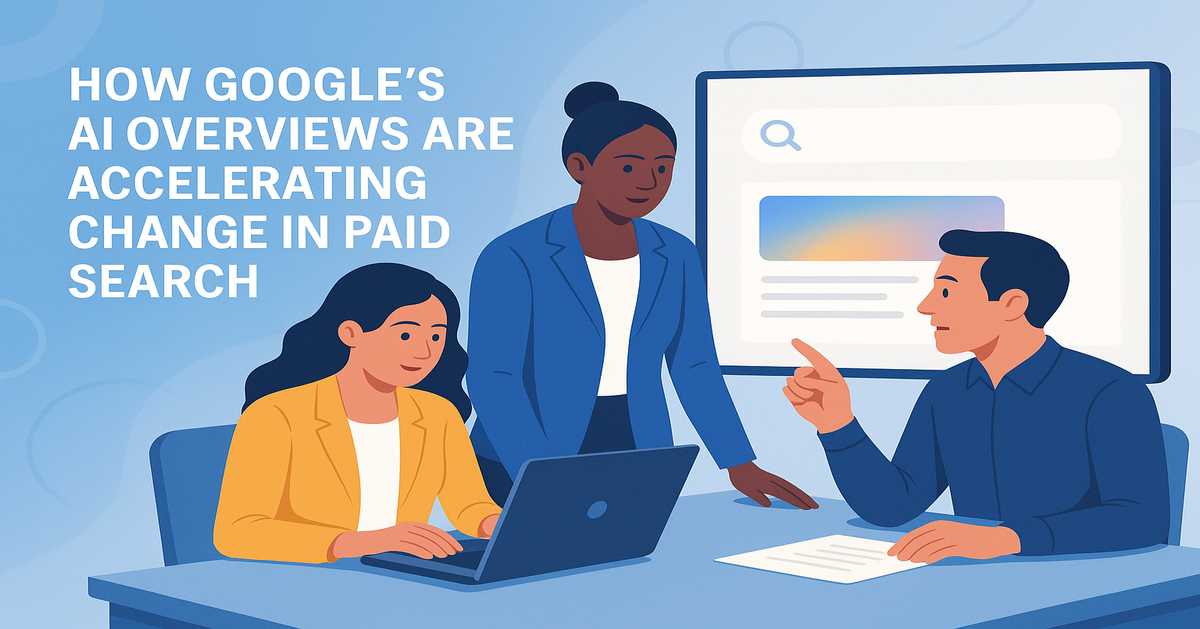When was the last time you searched for something on Google and got an AI-generated summary at the top instead of a list of links? This new experience is called AI Overviews, and it’s already changing how people search and more importantly, how businesses advertise. If you’re someone who depends on paid search traffic, this shift is something you cannot ignore.
Google’s search engine is evolving from being “a list of links” to becoming “an answer engine.” And that means user journeys, ad placements, and paid search strategy are changing at a rapid pace.
What Exactly Are Google’s AI Overviews and Why Are They Important?
Google’s AI Overviews appear at the top of the search results, summarizing answers from multiple sources using generative AI.
This means users may find what they’re looking for without scrolling, clicking websites, or even noticing ads.
So paid advertisers now face:
- Reduced click-through rates
- Changes in ad visibility
- More competition for “remaining” ad placements below the overview
In simple terms:
Less scrolling = fewer clicks = your ads must now work harder.
As one digital strategist noted, “Google is no longer a search engine – it’s a recommendation engine. Whoever fits the intent best wins.”
How Does AI Overviews Affect Paid Search Strategy?
The most visible impact is on search generative experience behavior. People are spending more time reading AI summaries and fewer are scrolling to see ads positioned below.
But this also means advertisers must rethink keyword targeting.
Instead of bidding broadly, marketers now need to ask:
- What is the user’s deeper intent?
- Will this keyword trigger an AI Overview before ads appear?
- Does my landing page deserve to be part of the AI-generated summary?
User intent optimization is now more valuable than broad keyword coverage.
A practical shift:
| Before | Now |
| Target high-volume keywords | Target high-intent contextual keywords |
| Focus on impressions and clicks | Focus on placement inside the AI answer ecosystem |
| Generic ad copy | Trust-driven, authoritative, benefit-led messaging |
Are Ads Becoming Less Visible? Should Advertisers Be Worried?
Not exactly ads aren’t disappearing. They’re shifting.
Google is experimenting with:
- Showing ads inside the AI Overview itself
- Placing ads right below AI summaries
- Contextual ad matching based on semantic search
This can increase relevance, but only if your ads are aligned with user intent.
Think less keyword targeting and more scenario targeting:
- “How to compare running shoes” → comparison-focused ad
- “Best CRM for small business” → case-study led ad
- “Nearby dentist open now” → hyper-local ad with instant action CTAs
What Should Marketers Do to Adapt Faster?
Here are the core strategic shifts:
1. Optimize for Informational Intent
Create content that earns placement inside AI Overviews.
(Since you’re publishing on ITech Manthra, here’s a helpful internal guide:
Read: How Google Earns Money at itechmanthra.com/blog/how-google-earns-money)
2. Strengthen Brand Authority
AI prefers trustworthy, cited information.
Reviews, social proof, and credible pages matter more than ever.
3. Track Changes in Click-Through Rates
Focus less on raw traffic and more on conversion-ready visitors.
4. Retarget The Awareness Gap
AI Overviews bring awareness, but not always conversions.
Retargeting closes the gap between discovery and purchase.
For additional strategic clarity, you may also explore:
Do Experts Believe AI Will Replace Paid Search Entirely?
Not at all. Paid search will evolve not disappear.
But the winners will be those who adapt quickly.
“AI won’t kill paid search; it will expose weak strategy,” says a performance marketing analyst.
If your ads are generic, unoriginal, or not aligned with true intent the AI search environment will show it immediately.
FAQ (Quick Answers)
Q1: Will AI Overviews reduce paid search traffic?
Yes, especially for high-level informational searches. But transactional searches may still convert well.
Q2: Should I reduce my Google Ads budget?
Not necessarily. You should reallocate budget toward higher-intent keywords and retargeting.
Q3: Can I get my brand included in AI Overviews?
Yes through authority-building content and strong topical relevance.
Q4: Will SEO become more important than ads now?
SEO + Paid Search must work together more than ever. One boosts visibility; the other accelerates conversions.
Q5: Is this change permanent?
AI in search is not going backward. This is the new direction.
Conclusion
Google’s AI Overviews are not just another update they represent a long-term shift in how people search and how brands reach customers.
Advertisers who adapt now will get leaner, smarter, and more profitable. Those who delay will see cost-per-click rise while conversions shrink.
If you’ve got thoughts or want specific strategy guidance feel free to comment or share this article with your marketing team.
